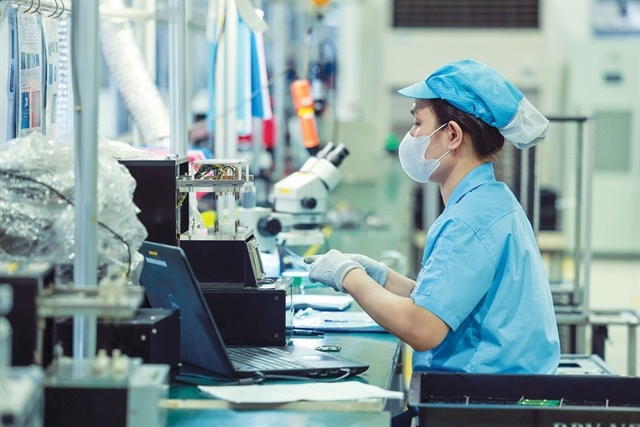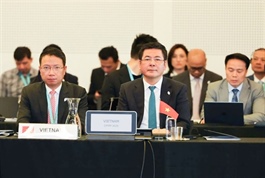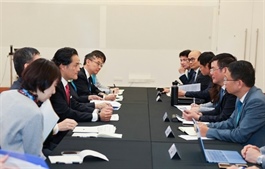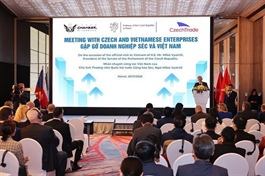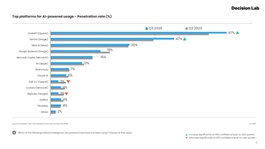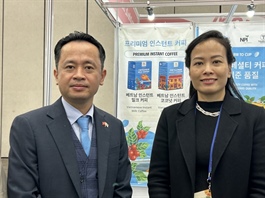High-tech law aims to boost innovation and investment
High-tech law aims to boost innovation and investment
The amended High-Tech Law is set to strengthen the legal framework for high-tech development and boost the country’s technological and innovation capacity.
Expected to be passed by the National Assembly on December 10, the amended law aims to complete the legal corridor for high-tech growth, streamline governance, and address obstacles that have limited progress since the 2008 High-Tech Law. Minister of Science and Technology Nguyen Manh Hung highlighted that the revision focuses on aligning development with socioeconomic needs, promoting international integration, and enhancing decentralisation to accelerate Vietnam’s high-tech sector.
Key updates include provisions that encourage domestic companies, small and medium-sized enterprises, and startups to invest in research and commercialise high technologies. The law also supports research institutes and universities in developing high-tech enterprises and turning their research results into marketable innovations.
The draft law prioritises foreign-invested enterprises (FIEs) that transfer core technologies and foster collaboration with domestic companies, strengthening national technological capabilities and avoiding foreign investment that relies solely on outdated technologies and low-cost labour.
|
It also classifies high-tech enterprises into two tiers. Tier 1 applies to enterprises in which domestic investors hold over 30 per cent equity and which receive transfers of core technologies at the ‘innovation and development’ level; these firms enjoy the highest corporate income tax incentives: four years of tax exemption, 50 per cent reduction for nine subsequent years, and a 10 per cent tax rate for 15 years.
Tier 2 applies to most other high-tech enterprises with incentives including two years of tax exemption, 50 per cent reduction for four years, and a 15 per cent tax rate.
In addition, the draft proposes abolishing the certificate of high-tech enterprise status and replacing it with a self-assessment mechanism based on established criteria, thereby reducing administrative procedures.
It also introduces regulations for ‘high-tech urban areas’ to create dedicated spaces for high-tech research, development, and application, linked with sustainable urban development.
At a recent NA session, Minister of Science and Technology Nguyen Manh Hung said, “The amended High-Tech Law aims to refine the legal framework to promote high-tech development in line with socioeconomic needs and international integration, strengthen decentralisation, and remove obstacles that have hindered progress over the past 17 years under the 2008 High-Tech Law.”
While largely supportive of the draft, many NA deputies, economic experts, and local leaders argued that the law needs further refinement, particularly in clarifying incentive policies for high-tech enterprises to ensure effectiveness and strike a balance between FIEs and domestic firms.
For example, Clause 2, Article 18 of the 2008 Law on High Technology stipulates that high-tech enterprises “shall enjoy the highest level of incentives in accordance with the laws on land, corporate income tax, VAT, export tax, and import tax.”
However, the amended draft merely states in general terms that high-tech enterprises “shall receive incentives and support in accordance with the law,” including tax incentives, land incentives, credit support, and support from the Investment Support Fund.
Experts warn that this wording weakens policy commitments and makes it harder for businesses to predict the long-term investment environment.
In its appraisal report, the NA’s Committee on Science, Technology and Environment noted that the draft still shows a gap between strategic intent and actual implementation mechanisms, especially regarding incentive policies.
“The drafting agency should inherit existing provisions and clearly specify the highest level of incentives for high-tech enterprises and strategic technology enterprises. This is necessary to create breakthroughs in high-tech development and raise technological capacity in accordance with Resolution 57-NQ/TW, and aligns with the core purpose of this amendment,” said Nguyen Thanh Hai, Chairwoman of the committee.
Under current regulations, high-tech enterprises enjoy top-tier incentives: four years of corporate income tax exemption, a 50 per cent reduction for the following nine years, a 10 per cent tax rate for 15 years, and even higher incentives for special projects; yet the amended draft Law preserves this package only for Tier 1 enterprises, while Tier 2 firms are entitled only to a two-year exemption, a 50 per cent reduction for four years, and a general 15 per cent tax rate.
Several members of the committee expressed concern that this could create disparities between FIEs and domestic businesses. Even if FIEs meet the technical criteria, their entirely foreign-owned capital structure would automatically place them in Tier 2, meaning they would face tighter incentives.
NA Deputy Pham Hung Thai, Deputy Secretary of Tay Ninh Party Committee and head of the province’s delegation, proposed, “The drafting body should review and harmonise the system of incentives for high-tech firms, zones, and urban areas within the law, including land incentives, administrative procedures, access to credit, and infrastructure support.”
Thai also recommended authorising the government to detail the scope and form of these incentives, ensuring coherence with related laws such as the Law on Investment, the Land Law, and the Planning Law, to prevent overlaps and facilitate investor operations.
Bui Ngoc Tuan, partner of Tax and Legal Advisory Services at Deloitte Vietnam, warned, “Reducing incentives could affect Vietnam’s ability to attract investment, especially as global competition for high-tech projects intensifies and Vietnam targets $40–50 billion in foreign investment annually through 2030.”
He added, “The Law on Investment stipulates that incentives must be safeguarded when legal frameworks change. We need a clear and transparent transitional mechanism to ensure investors continue to receive the incentives originally committed, avoiding policy risks that could disrupt the investment environment.”
- 19:10 21/11/2025


